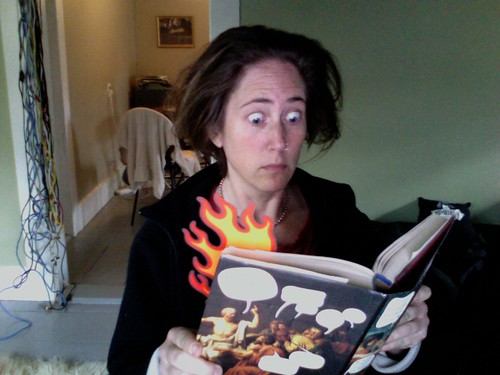
I’m aware that I have punted on Banned Books Week this year, but I’m okay with that. Seems like a lot of people did. Here are some of my old posts just for the record: 2000, 2001, 2002, 2003, 2004, 2006 and 2007; guess I skipped it in 2005 also.
The Banned Books Week eponymous website, owned by ABFFE looks sort of the same as last year, only with new events. I really appreciate the effort they put into a nice-looking site, but in 2008 a few pages with links to other pages and one scrollable list of events worldwide seems a little flat.
ALA has been busy launching their new website and Banned Books Week didn’t even appear on the front page the last few times I looked. Their Banned Books Week pages have a slick logo (yay!) but no page titles and they’re still using our browsers to resize images which means the pages still load like crap for people in dial-up land. I know it’s picky, but I do think it’s impotant in the same way that I think ala.org/bbooks is a nicer URL to see in my address bar than any of the ones I wind up looking at. The pages I linked to on ALA.org from my 2006 post are all gone.
Additionally there’s the fact that it’s a month and change before the US elections and I’m tired of fighting with people about Sarah Palin, tired of defending the ALA against people who don’t believe in intellectual freedom for minors (when I have my own beefs with ALA, but that is not one of them) and tired, as always, of people using holiday-type events as a time when they tell me it’s okay and even patriotic to shop for things.
I worry somewhat that not wanting to have the same fights every year makes me susceptible to self-censorship, as this post by Anirvan contemplates. I also worry that nitpicking over the differences between “banned” and “challenged” books — though I think it’s real and important — obscures the real issues which to me are the continued corporatization of everything, and the shift from content owning to content renting as a librarianship model.
As an example, I have been working with tiny libraries using Overdrive for years now and I’m sorry their product is no good by any standard other than “well it’s the best we can do for now” and this hits especially hard out here in digital divide land with libraries with five-figure budgets. I’m aware that there always has to be a balance and I go to the supermarket [or the farm stand] for my food rather than grow it myself so I really do understand why labor-saving devices and services are important and possibly worth money.
So, the threats to our intellectual freedom and our freedom to read are not just people who want to harass the librarian into handing over a computer or removing a book from the shelf. They’re also people who get us to accept licenses that bind us unfairly and give away our rights, or the people who let us show movies, but not use their names in public advertising. People who make us afraid to photocopy a book chapter. People who act like we’re possibly thieves when we watch a video at home with a few people. People who flash warnings on our computer that we don’t understand that make us and our patrons feel that we’re unsafe. People who make us buy digital content twice in two different file formats. People who want us to buy an entire 10 CD set again because one of them got scratched. People who blur the line between necessary security upgrades and enhancements we don’t need. People who make us feel that filters are actually “protecting” us from anything. People who have a vested interest in us not understanding our own technology.
So I think I understand the steps for keeping books on the shelves at my local library — have a policy, make sure everyone understands it, be civil and respectful to everyone because you’re everyone’s librarian — and even how to deal with a search warrant. What I’m not sure of is who I talk to when I’m concerned about content ownership models and legislation unfavorable to libraries and ultimately to citizens. I know a few good places to start — the EFF, the ACLU, the CDT, Privacy Rights Clearinghouse — but I can always use more. Happy Last Week Was Banned Books Week Week.
